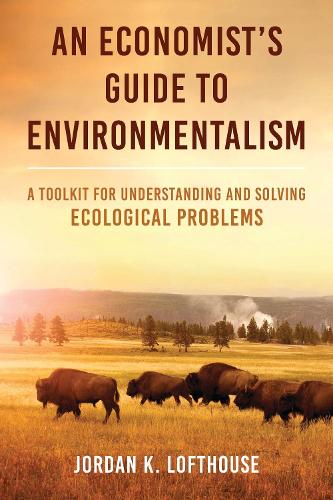
An Economist's Guide to Environmentalism: A Toolkit for Understanding and Solving Ecological Problems
(Hardback)
Publishing Details
An Economist's Guide to Environmentalism: A Toolkit for Understanding and Solving Ecological Problems
By (Author) Jordan K. Lofthouse
Bloomsbury Publishing PLC
Rowman & Littlefield Publishers
13th November 2025
United States
Classifications
General
Non Fiction
Conservation of the environment
Physical Properties
Hardback
248
Width 152mm, Height 229mm
Description
Explains how economics can be used to solve an array of environmental issues from endangered species to global warming.
Many species are threatened with extinction and landscapes are being destroyed. Water is becoming increasingly scarce, harming ecological systems and human societies. Perhaps the most pressing environmental problem is human-caused climate change. What caused these problems, and what can we do about them
In An Economists Guide to Environmentalism, Jordan K. Lofthouse demonstrates how the field of economics can explain the rise of environmental problems and offers guidance on unique solutions being tested throughout the United States. Lofthouse assembles a toolkit of easy-to-understand economic concepts and then applies those tools to a variety of environmental problems. These include the concepts of incentives, constraints, knowledge, costs, benefits, trade-offs, unintended consequences, institutional analysis, and more.
The examples in this book highlight how environmental issues often stem from poorly defined property rights and a failure of government policies to adequately promote conservation. Lofthouse argues for novel solutions such as assigning property rights to wildlife on the verge of extinction, private approaches to land conservation, and the implementation of water markets. Addressing global-scale problems like climate change requires the innovative and entrepreneurial discoveries of many different people in governments, markets, and civil society. Readers of this book will discover new opportunities and a refreshing, practical approach to protecting the planet through economics.
Reviews
"This book is an easy read that will make you rethink how we solve environmental problems. Trying on the Lofthouse thinking cap, you will discover how to improve our environment with more cooperation and less conflict. -- Terry L. Anderson, John & Jean DeNault Senior Fellow, Hoover Institution, Stanford
Jordan Lofthouse is a serious economic thinker; he is also passionate about the wonders of nature. These are not in conflict with one another in Lofthouse's rendering but instead work hand in hand to not only understand the world and the dysfunctions caused by various policies related to the environment, but how market mechanisms and civil society can work to conserve and protect the wonders of nature, and also improve our ability to appreciate not only the beauty but the power of nature. Trade-offs, incentives, informational feedback, and social cooperation under the division of labor are not in conflict with a deep passion and concern with nature, and in fact in Lofthouse's hands are intellectual tools for environmentalism. -- Peter J. Boettke, Distinguished University Professor of Economics, George Mason University
Author Bio
Jordan K. Lofthouse is a senior fellow with the FA Hayek Program for Advanced Study in Philosophy, Politics, and Economics at the Mercatus Center at George Mason University. He is the coauthor of The Reality of American Energy: The Hidden Costs of Electricity Policy. He was born and raised in Rexburg, Idaho, and he currently lives in Falls Church, Virginia.
